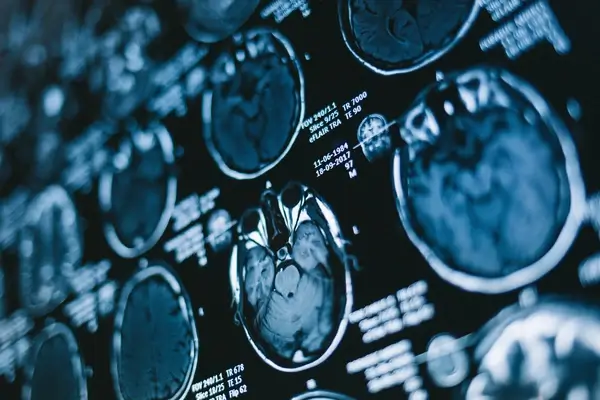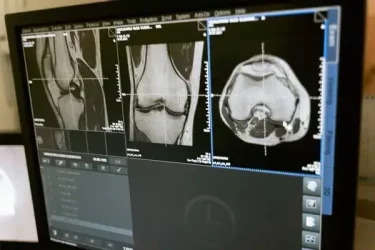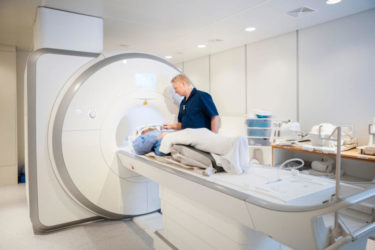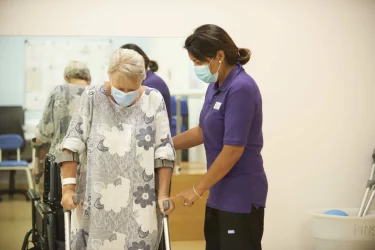If you’ve been told you need an MRI scan, chances are you’re wondering how long you might have to wait. As with many NHS waiting times, MRI waiting times are potentially lengthy. But is that the full story? Join us as we investigate the world of MRI and ask how long you’ll likely wait for a scan.

Private diagnostic imaging at a glance:
- Appointment within 2 weeks
- Prices start from £334
- Available at a range of our UK locations
Call us on: 0330 173 5551
What is an MRI?
An MRI (Magnetic Resonance Imaging) scan is a key diagnostic test that uses strong magnetic fields and radio waves to create detailed images of your body. The scans are primarily used to explore injuries and damage to muscles, tendons, bones and ligaments. They can also provide imaging of organs and bodily abnormalities and are used to diagnose different health issues.
During an MRI scan, you will be asked to lie down on a bed that slides into the MRI machine. The scanner then takes images of the parts of your body that require diagnosis. You may be asked to change into a hospital gown and hold your breath for certain parts of the process. This is because you need to remain as still as possible for the machine to produce detailed images. MRI machines are generally quite noisy, so you will be given ear plugs and headphones so you can listen to music.
You must remove any metal objects such as jewellery before the procedure. An MRI scanner may not be suitable for people with metal implants. Ask your doctor for more guidance. Occasionally, contrast agents are used which, in rare cases, can cause an allergic reaction or side effects.
Who performs your MRI scan?
MRI scans are performed by specialist MRI radiographers. A diagnostic radiographer is a health professional who has undertaken degree level training in all aspects of medical imaging. This includes x-rays, CT, ultrasound and MRI scans.
MRI images are reported by a consultant radiologist – a doctor speciality trained in interpreting diagnostic images.
Reasons you may need an MRI scan
An MRI scan can be used to diagnose a wide range of health conditions. The accuracy provided by the images help radiologists detect abnormalities and problems with bones, organs, blood vessels, ligaments and joints.
For example, MRI scans are particularly helpful for spotting problems with the spine, ligaments, soft tissues and nerves. This makes them a good option for people suffering from back pain or sports injuries that have been difficult to diagnose.
Issues such as headaches, balance problems, memory loss and abdominal pain can also be investigated using an MRI scanner.
How long does it take to get an MRI scan on the NHS?
According to the NHS Constitution, the aim is for patients to receive their MRI scan six weeks after referral. The NHS Waiting List Tracker is a useful tool that can give you an idea of the waiting times facing NHS patients in your region.
Average waiting time for MRI scans on the NHS
The average estimated time for an MRI scan with the NHS is between six and 18 weeks depending on the location of the clinic.
How do I find out where I am on the MRI waiting list – NHS?
The number of patients waiting for more than six weeks for an MRI through the NHS was around 26% at the start of this year.
How long does it take to get a private MRI?
If waiting for six weeks or longer sounds too long to wait, you could consider private care.
If you are a private patient with Practice Plus Group, getting an MRI scan takes around one week from your referral. However, this will depend on the location of the hospital you’re visiting.
Benefits of going private
Alongside shorter waiting times, choosing private healthcare with Practice Plus Group has a range of other benefits:
- unrivalled CQC ratings
- high levels of cleanliness and infection control
- personalised care
- experienced radiographers and radiologists
- free onsite parking
- results sent within three working days.
Practice Plus Group is recommended by 97% of patients.
How long is the MRI referral waiting time?
Patients seeking a scan through the NHS will need a referral form from their GP. The NHS waiting time aim between referral and diagnostic imaging is six weeks.
If you opt for a private diagnostic test, you may be able to self-refer by submitting an enquiry form or calling us. A member of our team will ask you some questions about the reason for the scan, your general health and GP details. If a scan is deemed necessary, you’ll be booked in for a time and day that suits you.
How long should an urgent NHS referral take?
In England, an urgent referral means that you should see a specialist within 2 weeks.
How do I know if my referral is urgent?
This will be based on your doctor’s assessment. He or she will determine how urgently you need a diagnostic test.
How can I speed up my doctor’s referral?
If you want to speed up the referral process, you could opt for private healthcare. At Practice Plus Group, the waiting time between referral and MRI scan is usually just one week.
How long should you wait between MRI scans?
This will depend on the health issue you are dealing with. Your doctor or health professional will inform you when an MRI scan is required or if you need any follow-up procedures.
How long do you have to wait for MRI results?
On the NHS, you may need to wait one or two weeks to receive the results of your MRI. At Practice Plus Group, your results will be available to your referrer three working days after your scan.
Can an MRI be read immediately?
An MRI scanner produces highly detailed imagery that requires careful analysis from radiologists. This means results can take up to two weeks to process.
Why does it take so long to get MRI results?
An MRI scan itself can take between 15 minutes to an hour to complete. The process takes longer than other diagnostic imaging (like x-rays) due to the number of images needed to build a 3D picture of your affected body part. Results can take a while to process due to the detailed nature of the imagery and the in-depth analysis required.
What to do while waiting for your MRI
We know that waiting for diagnostic procedures can be stressful and frustrating. This can especially be the case if you‘re dealing with pain that affects your everyday quality of life.
To help manage anxiety and prepare for your upcoming test, you may find the following tips useful:
- distract yourself with hobbies and relaxing activities
- try to maintain your normal habits and activities as much as possible
- try to get some exercise if you can, whether that’s walking or gentle stretching
- maintain a healthy diet to give your body the best chance of a full and speedy recovery
- if you’re worried or stressed, share your concerns with friends, family or your GP
- stay informed to feel in control. Whether that means making notes at your doctor’s appointments or researching the MRI process.
If the wait is putting too much pressure on your physical or mental health, it may be worth considering options to reduce your waiting time.
How to reduce your MRI scan waiting time
MRI scan NHS waiting times can be long and frustrating. One way to significantly reduce the wait is to become a private patient.
This will give you control over the timing and location of your MRI scan. It will also ensure a faster diagnosis and potentially provide peace of mind.
At Practice Plus Group, the waiting time between referral and MRI scan is just one week (depending on location).
To book a private MRI scan with Practice Plus Group, you can:
- Call us on 0330 173 1313
- Submit an enquiry form
One of our team will be in touch to discuss your symptoms and gather details.





